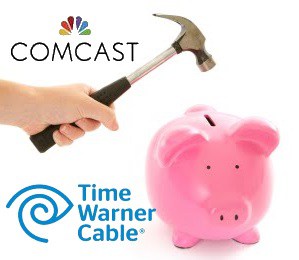 A week after its deal with Comcast collapsed, Time Warner Cable may be in the buying mood.
A week after its deal with Comcast collapsed, Time Warner Cable may be in the buying mood.
The Wall Street Journal reports the cable giant approached privately held Cox Communications about a deal. Cox told them they weren’t interested.
Time Warner Cable’s apparent interest in cutting a quick deal with another operator may be a sign they are not going to lie down for another expected offer from Charter Communications that could come within days or weeks. The groundwork for such a deal is already being laid.
Cox, like Cablevision, have been perennially rumored takeover targets, but both have proved elusive. In 2004, Cox went private for a second time and a second generation of the Dolan family, which holds a controlling interest in Cablevision, continues to be integrally involved in Cablevision’s operations.
Time Warner Cable still has several options to pursue acquisitions. Suddenlink customers are in open revolt over that company’s decision to enforce usage caps on its broadband service. Both Charter and Mediacom are routinely rated poor by customers and could be swayed into a deal. Bright House Networks already relies on Time Warner Cable for programming deals and technical services.
Updated 4:22pm — Reuters is reporting Time Warner’s denials that it approached Cox for a deal. “It’s simply not true. We have not engaged in any discussions with Cox,” Time Warner Cable’s spokeswoman Susan Leepson told Reuters.


 Subscribe
Subscribe
 Charter has deals pending with both Comcast and Time Warner Cable to launch GreatLand Connections and have plans to takeover Bright House Networks, both contingent on the Comcast-Time Warner Cable merger getting approval.
Charter has deals pending with both Comcast and Time Warner Cable to launch GreatLand Connections and have plans to takeover Bright House Networks, both contingent on the Comcast-Time Warner Cable merger getting approval. Independent television in Great Britain
Independent television in Great Britain  John Malone’s Liberty Global is seen as a leading contender, already owning a 6.4% stake in ITV acquired from BSkyB for $824 million. Liberty Global and Discovery Networks have maintained close association and jointly bid $930 million to acquire All3Media, the production arm of reality shows like “Undercover Boss.”
John Malone’s Liberty Global is seen as a leading contender, already owning a 6.4% stake in ITV acquired from BSkyB for $824 million. Liberty Global and Discovery Networks have maintained close association and jointly bid $930 million to acquire All3Media, the production arm of reality shows like “Undercover Boss.”